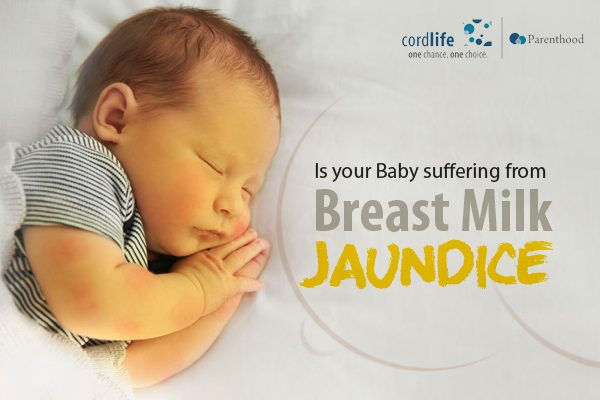Table of Contents
Your nine months’ long wait is finally over! Your little one has arrived, and when the nurse places the new-born in your arms, you realise that you have given birth to a beautiful little princess.
But, after a few weeks, your baby’s skin and eyes starts giving you jitters. Both seems to have turned a little yellow. You visit your paediatrician only to find out that your baby may be suffering from (breastmilk) jaundice.
Well! Jaundice is a common health condition among new-born babies. While it is 60% common among full-term babies; 80% pre-term babies are in this condition after a few weeks of their birth1.
However, neonatal jaundice, is mostly associated with breastfeeding or breastmilk, and stays longer than physiological jaundice2.
What Causes Breastmilk Jaundice?
Although the exact reason behind breastmilk jaundice is not known, but it is a type of jaundice associated with breast-feeding, where certain substances in the breast milk (with an inadequate supply) do not have the ability to process the bilirubin, (a yellow pigment that passes through the baby’s liver and releases itself into the intestinal tract, is responsible for breaking down the red blood cells in the baby’s body), resulting in a significant rise in its level. In new-borns, however, the liver is not fully developed and it may not efficiently eliminate the bilirubin from the baby’s blood, or reduce its level. The bilirubin then settles in the skin, leaving the skin and the white of the eyes of the babies with a yellow tint3.
This is a rare condition and is found in 10% of the breastfed neonates, after the first week of their birth. This can last anywhere between 3 to 12 weeks4.
How Does The New-born Feel?
Breastmilk jaundice, not just makes the new-born appear yellow, but you may also find your little one to be cranky, terribly tired, less active and does not tend to gain much weight.
How Is Breastmilk Jaundice Tested?
The breast-feeding or lactation specialist, who teaches you the breastfeeding techniques, may observe the feeding carefully, not just to ensure that the milk supply to baby is adequate but also to confirm that your baby is latching onto the breast well. The doctor further conducts a blood test of the baby to check if the bilirubin level is high enough to show the symptoms of breastmilk jaundice.
How Is Breastmilk Jaundice Treated?
With careful monitoring and with the right kind of treatment, this condition in babies goes away on its own. (Basically, as soon as the babies get their desired amount of milk and their liver starts functioning properly). However, in severe cases, where the jaundice may persist beyond the sixth week of the baby’s birth, aggressive treatment is necessitated.
Generally, the specialists will advise you to breastfeed your little one more often. Maybe 8 to 12 times a day. And breastfeeding your baby so many times in a day, may improve the milk supply, which in turn may keep your baby hydrated and allow her to produce more bowel movements, thus reducing the bilirubin level.
However, if the condition happens to be serious, your baby may be hospitalised for a few days and phototherapy may be carried out to treat the condition. During the phototherapic treatment, your baby will be placed under the observation of a light for about one or two days. With the gradual changes in the light, the structure of bilirubin molecules will also get removed from your baby’s body.
To Conclude
There’s no denying that being a new mother, breastfeeding your new-born is one of the cherished moments in your life.
But it doesn’t end there. It is also one of the most crucial steps as your baby gets her much-needed nutrients from your milk and establishes a deep connection with you, right away.
However, breastfeeding, like everything else comes with its own set of challenges. And breastmilk jaundice is just one of them. By now, as you are aware that breastmilk jaundice can pose a few challenges in your little one, try out the above-mentioned way outs to get control over the situation. Even after these way outs, if you think, you are unable to manage, consult the doctor immediately.
